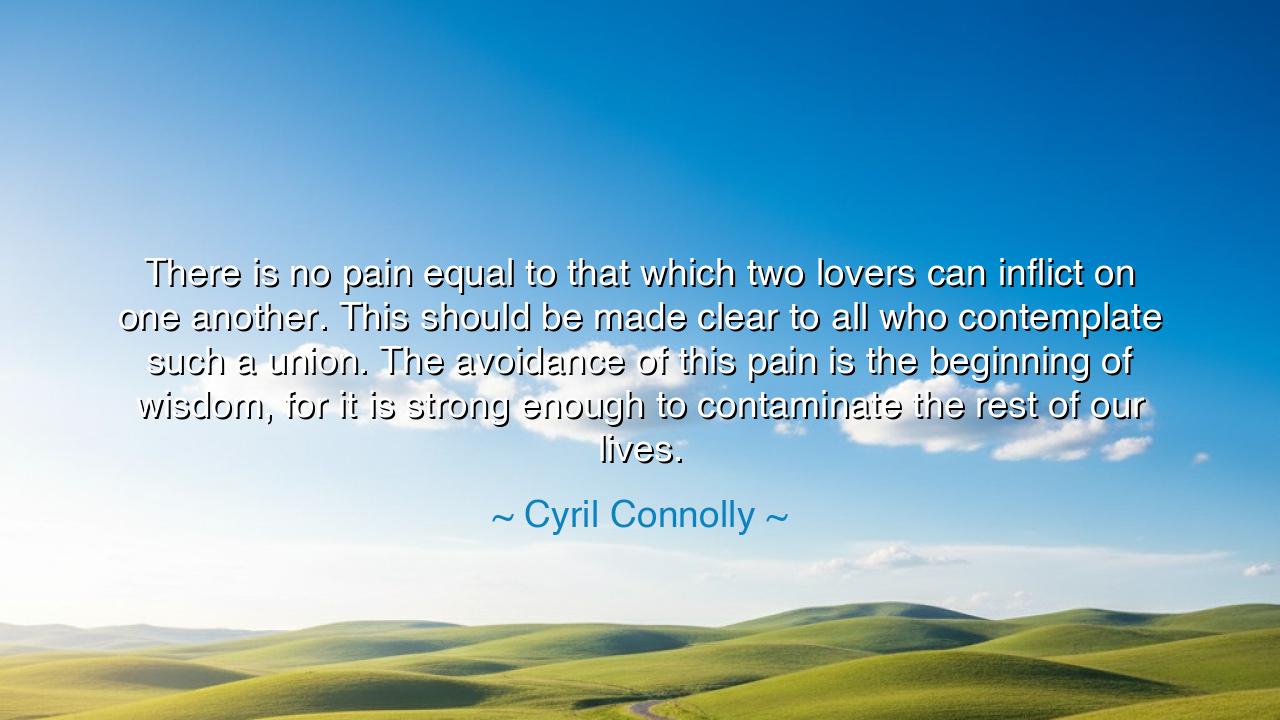
There is no pain equal to that which two lovers can inflict on
There is no pain equal to that which two lovers can inflict on one another. This should be made clear to all who contemplate such a union. The avoidance of this pain is the beginning of wisdom, for it is strong enough to contaminate the rest of our lives.






Cyril Connolly, with the pen of a sorrowful sage, declares that there is no pain so piercing as that which two lovers may inflict upon one another. For love, which bares the soul and strips away all armor, leaves each heart vulnerable to wounds no stranger could deliver. This pain, he warns, is not a fleeting sorrow, but a wound deep enough to contaminate the rest of our lives. Therefore, he calls it the first step of wisdom to recognize and, if possible, to guard against such torment.
The ancients spoke often of the dangers of love’s fire. Ovid, in his verses, warned that passion could lift men to ecstasy or cast them into despair. And who has not heard of Samson and Delilah, where love’s betrayal brought not only heartbreak but ruin to strength and destiny alike? Connolly’s words echo this timeless truth: that the one who holds our heart in trust wields the power to save us—or to shatter us utterly.
History reveals countless tragedies born of such wounds. Recall Antony and Cleopatra, bound together by passion, yet leading each other toward destruction. Their union, fierce and intoxicating, ended not in peace but in despair, leaving empires shaken and lives undone. What foreign enemy could have harmed Antony so deeply as the love he shared with Cleopatra, which, once turned to ruin, consumed both their souls?
Connolly does not speak to banish love, but to caution that its fires must be approached with reverence. To contemplate such a union is to step into a realm of immense joy and immense peril. Love can ennoble, yes, but when it curdles into betrayal or cruelty, the torment is so profound that it stains the spirit long after the moment has passed. Thus, the avoidance of this pain—whether by wisdom, patience, or restraint—is itself a safeguard for the soul.
Let this be the teaching to future generations: love is a force mighty as flame, capable of warming the coldest heart or reducing it to ash. Approach it not with folly, but with eyes open to its power. For only those who understand its peril as well as its promise can hope to find in it not destruction, but lasting strength. Wisdom begins when we recognize the depths of love’s wounds, and tread with care upon its sacred ground.






HTNguyen Hoai Trong
I find myself questioning the universality of this claim. Are all romantic relationships capable of such intense harm, or does it depend on the individuals involved? Could it be that the intensity of love that leads to pain is also the source of joy, creativity, and growth? I’d like a perspective on whether avoiding love to prevent suffering truly constitutes wisdom, or if it risks depriving life of some of its most meaningful experiences.
BNHa Bang Nguyen
This quote makes me wonder about the long-term consequences of heartbreak. How often does pain from lovers truly 'contaminate' the rest of life, and is this an unavoidable aspect of human relationships? I’m curious whether Connolly views this as a reason to avoid love altogether or as a call for greater awareness and emotional preparedness. Could the knowledge of potential suffering deepen our empathy and understanding, rather than merely cautioning against attachment?
HApham huyen anh
Reading this, I can’t help but reflect on the tension between love and self-preservation. If avoiding the pain of romantic entanglement is considered wisdom, does that imply a certain skepticism or fear is necessary for emotional survival? I’d like to consider whether this perspective encourages detachment or if it simply advocates mindful engagement in relationships, and how one might cultivate resilience against such profound emotional risks.
TNAnh Thu Nguyen
I’m struck by the intensity of the claim that lovers can inflict unparalleled pain. Does this mean romantic relationships are uniquely capable of shaping our emotional lives, more so than friendships or family ties? I’d like to explore whether Connolly sees this pain as a cautionary observation or a fundamental truth about human attachment. How might one navigate love carefully without losing its transformative potential?
MMMinh MIn
This statement makes me question whether love is inherently destructive or if it simply magnifies human vulnerabilities. Is the author suggesting that emotional intimacy carries unavoidable risk, or that only certain types of love are dangerous? I wonder how one balances the wisdom of avoiding potential pain with the desire for connection. Could it be that some of life’s most profound growth comes precisely from experiencing and surviving such emotional challenges?